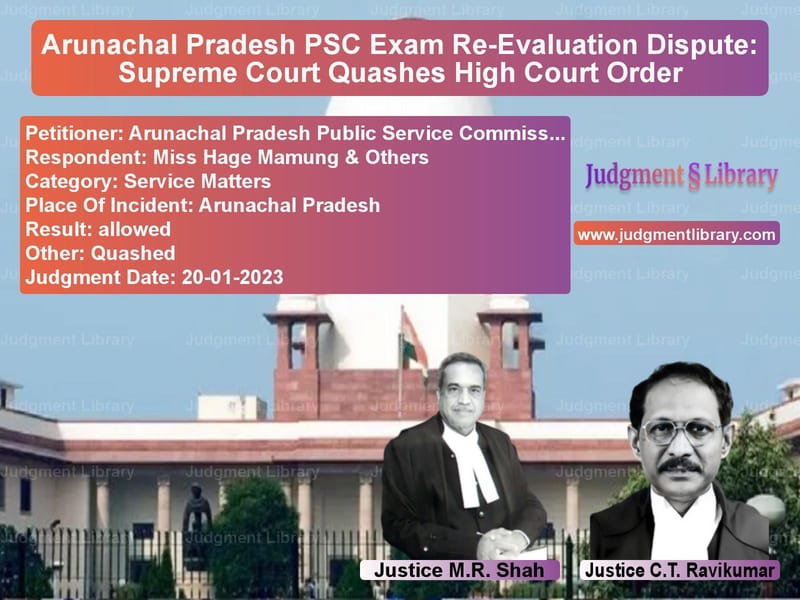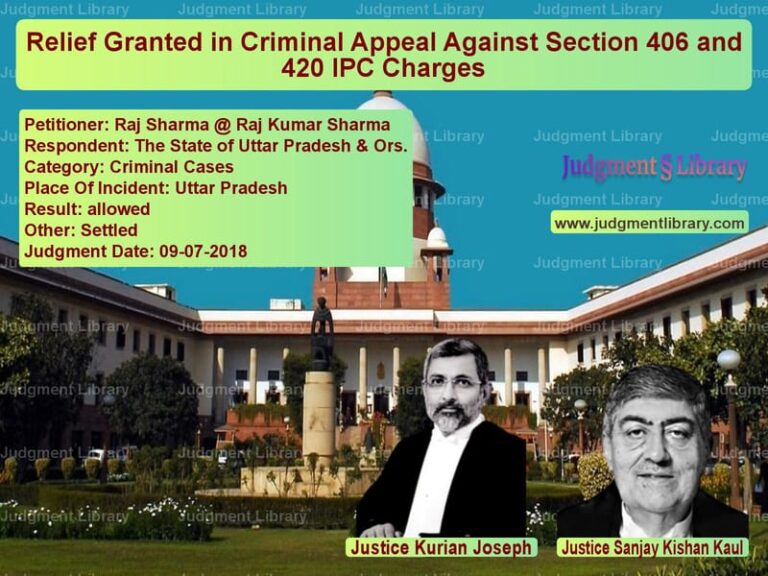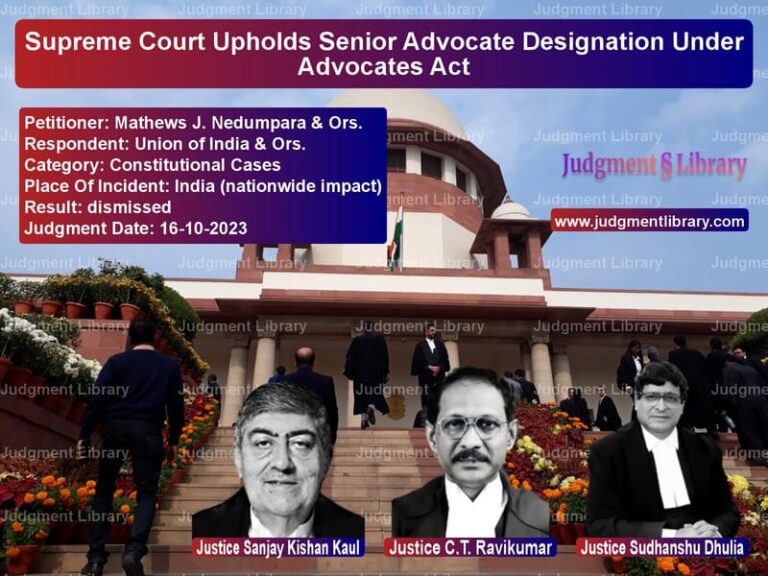Arunachal Pradesh PSC Exam Re-Evaluation Dispute: Supreme Court Quashes High Court Order
The case of Arunachal Pradesh Public Service Commission & Another v. Miss Hage Mamung & Others presented an important legal dispute concerning the re-evaluation of answer sheets for a public service recruitment examination. The Supreme Court examined whether the High Court was justified in ordering a re-evaluation despite the absence of a provision for it in the Arunachal Pradesh Public Service Commission’s (APPSC) guidelines. The judgment reaffirmed the principle that courts should not interfere in public recruitment processes unless explicitly provided for in the rules.
The dispute arose after the APPSC conducted an examination for the post of Agriculture Development Officer (ADO) and subsequently declared the results. The respondent, Miss Hage Mamung, was not selected, and upon inquiry, she discovered that an error in the answer key led to unfair marking. Dissatisfied with the pro-rata marking system used by APPSC, she challenged the results in the High Court. The High Court ruled in her favor and directed the re-evaluation of the papers. However, the APPSC appealed this decision in the Supreme Court, arguing that the High Court’s order was arbitrary and contrary to established examination guidelines.
Background of the Case
The APPSC issued an advertisement on September 21, 2016 for the recruitment of 22 Agriculture Development Officers. Candidates, including the respondent, appeared for the written examination, followed by a viva-voce. When the final selection list was published, Respondent No.1 (Miss Hage Mamung) found that her name was not included. Upon filing an RTI application, she received her answer sheet and score details:
- She secured 268.45 marks in the written exam.
- Respondent No.4, who was ranked 21st in the merit list, secured 268.75 marks.
During this process, it was discovered that two questions (Nos. 12 and 31) had incorrect answer keys. The APPSC, acknowledging the error, decided to cancel these questions and award marks to all candidates on a pro-rata basis. Under this method, each candidate received marks based on their overall performance instead of directly evaluating the correctness of their answers.
The respondent argued that this approach was unfair. She claimed that:
- She had correctly answered both questions.
- Respondent No.4 had correctly answered only one of the two disputed questions.
- Despite answering both questions correctly, she was ranked below Respondent No.4.
She contended that a direct evaluation of the answers instead of pro-rata marking would have resulted in her ranking 21st, securing her selection for the position.
Legal Issues and Arguments
Appellants’ (APPSC) Arguments
- Absence of re-evaluation provision: The APPSC argued that its guidelines did not allow for re-evaluation.
- Pro-rata marking ensures fairness: It was a widely accepted method used in public exams to neutralize errors without disrupting the overall merit ranking.
- Judicial overreach: The High Court’s order amounted to interference in recruitment processes, violating established precedents on exam evaluation.
- Precedents: The APPSC cited Dr. NTR University of Health Sciences v. Dr. Yerra Trinadh, where the Supreme Court held that courts should not interfere in matters of examination evaluation unless a clear violation occurs.
Respondent’s Arguments
- The APPSC’s pro-rata marking system benefited candidates who answered incorrectly.
- The system created an unfair ranking order and placed the respondent below less deserving candidates.
- The High Court’s intervention was necessary to ensure a just and accurate merit list.
- There was no rule explicitly prohibiting re-evaluation, and courts had previously ordered re-evaluations in exceptional cases.
Supreme Court’s Judgment
The Supreme Court examined whether the High Court’s directive to re-evaluate the answer sheets was valid. Key observations included:
- The APPSC’s decision to cancel the two disputed questions and award pro-rata marks was consistent with its established examination guidelines.
- Judicial intervention in competitive examinations should be limited to cases of gross illegality, which was not present in this instance.
- Allowing re-evaluation for only two candidates (Respondents 1 and 4) instead of all affected candidates was unfair and could distort the overall merit ranking.
- Re-evaluation orders should be backed by explicit provisions in recruitment rules, which were absent in APPSC’s guidelines.
The Supreme Court ruled:
“The impugned judgment and order passed by the Division Bench of the High Court ordering re-evaluation of the papers of respondent No.1 and respondent No.4 is hereby quashed and set aside.”
Impact of the Judgment
The Supreme Court’s ruling reaffirmed the principles governing judicial interference in competitive examinations. Key takeaways from the judgment include:
- Finality of evaluation processes: Once an examination authority has followed its established guidelines, courts should avoid disrupting the results unless clear evidence of irregularity is presented.
- Limitations of judicial intervention: The judgment ensures that courts do not routinely intervene in exam disputes, preventing unnecessary litigation and administrative challenges.
- Consistency in recruitment procedures: The ruling upholds the principle that re-evaluation should only be ordered if explicitly provided for in examination rules.
- Protection of merit-based selection: By preventing selective re-evaluation, the judgment ensures that merit rankings remain consistent and fair for all candidates.
Conclusion
The Supreme Court’s decision in this case sets a crucial precedent in recruitment law and public service examinations. By reinforcing that courts should not interfere in well-established examination processes unless a clear legal violation is demonstrated, the ruling protects the integrity of competitive exams. The judgment underscores the importance of adhering to predefined examination rules and prevents disruptions caused by selective re-evaluations. For aspirants of government jobs and public service commissions, this case serves as an important reference for understanding the legal framework governing recruitment examinations.
Petitioner Name: Arunachal Pradesh Public Service Commission & Another.Respondent Name: Miss Hage Mamung & Others.Judgment By: Justice M.R. Shah, Justice C.T. Ravikumar.Place Of Incident: Arunachal Pradesh.Judgment Date: 20-01-2023.
Don’t miss out on the full details! Download the complete judgment in PDF format below and gain valuable insights instantly!
Download Judgment: arunachal-pradesh-pu-vs-miss-hage-mamung-&-o-supreme-court-of-india-judgment-dated-20-01-2023.pdf
Directly Download Judgment: Directly download this Judgment
See all petitions in Recruitment Policies
See all petitions in Public Sector Employees
See all petitions in Legal Malpractice
See all petitions in Contempt Of Court cases
See all petitions in Judgment by Mukeshkumar Rasikbhai Shah
See all petitions in Judgment by C.T. Ravikumar
See all petitions in allowed
See all petitions in Quashed
See all petitions in supreme court of India judgments January 2023
See all petitions in 2023 judgments
See all posts in Service Matters Category
See all allowed petitions in Service Matters Category
See all Dismissed petitions in Service Matters Category
See all partially allowed petitions in Service Matters Category







